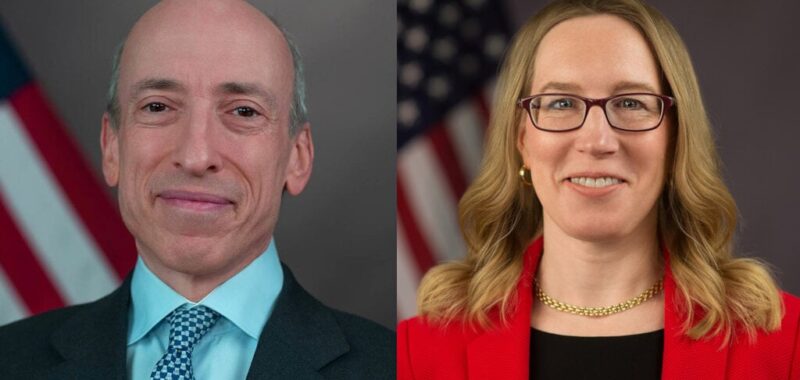Will he be sacked? Or will he quit? Either way, crypto industry antagonist Gary Gensler’s days as Securities and Exchange Commission Chair are likely to be numbered.
President-elect Donald Trump is poised to hammer home one of his most popular crypto promises made earlier this year. At least, that’s what many in the industry are hoping for.
“I will fire Gary Gensler on day one,” Trump declared at a Bitcoin conference in July, prompting thunderous applause from thousands in Nashville. “The day I take the oath of office, Joe Biden and Kamala Harris’ anti-crypto crusade will be over.”
Regardless of the fact that Trump’s words cut against Supreme Court precedent—as Decrypt has reported, a president can’t fire an SEC chair without cause—the names of several potential Gensler replacements are making the rounds ahead of Trump’s inauguration on January 20.
That list includes Hester Peirce and Mark Uyeda, both SEC commissioners; Dan Gallagher, Robinhood’s chief counsel; former chairman of the U.S. Commodity Futures Trading Commission, Chris Giancarlo; and former Binance.US CEO Brian Brooks.
Appointed by President Joe Biden, Gensler’s term as chair doesn’t end until 2026—with 18 months of wiggle room following his expiration date.
Still, SEC chairs have historically resigned when an opposing political party assumes control of the White House. Even so, Gensler, a Democrat, could be immediately demoted from chair to commissioner by Trump, leaving someone else to take up the mantle.
John Stark, an ardent crypto skeptic who once served as an SEC enforcement attorney, made the case for Peirce on Thursday.
“Most of the time, they just resign because they know that a new chair is going to be appointed,” Stark said. “The president will then immediately appoint someone to be acting chair, and that will usually be the senior member of that party.”
Nicknamed “Crypto Mom” for her support of the industry, Peirce has disagreed with the SEC’s penchant for suing crypto companies since she was appointed in 2018. Dissenting against an NFT-focused enforcement action in September, she derided the SEC’s approach as “misguided and overreaching,” creating many needless cases.
Of the SEC’s five current commissioners, three belong to the Democratic Party, including Gensler. Meanwhile, Peirce’s Republican colleague, Uyeda, who was appointed in 2022, is also being pitched as a potential contender.
“I’d give decent odds to Uyeda,” Jake Chervinsky, chief legal officer at Variant Fund, said in a tweet on Wednesday, adding that he thinks Peirce doesn’t want the job. He caveated, however, “I expect Trump may prefer to bring in someone new of his own.”
Peirce did not immediately respond to a request for comment from Decrypt.
With Trump’s transition team co-chaired by Cantor Fitzgerald Chairman and CEO Howard Lutnick, an outside pick to lead the SEC appears possible Fitzgerald views Wall Street as ripe for top cabinet positions, POLITICO reported Wednesday.
Robinhood’s Chief Legal Officer Gallagher would be a “natural choice,” according to one former SEC official who spoke with POLITICO.
Formerly serving as an SEC commissioner from 2011 to 2015, Gallagher testified before Congress earlier this year about digital asset regulation and a lack of “regulatory clarity at the federal level.”
After injecting over $119 million into federal elections this year, some leaders of digital asset firms are making calls of their own for Gensler’s replacement. Ripple Labs CEO Brad Garlinghouse encouraged Trump to appoint Gallagher as SEC chair on Wednesday, as well as Brooks or Giancarlo.
“They’d be massive upgrades in rebuilding the rule of law (and reputation) at the SEC,” Garlinghouse said. “Fire Gensler. Day 1, no delays.”
Nicknamed “Crypto Dad” for his commitment to digital assets as chairman of the U.S. Commodity Futures Trading Commission (CFTC) from 2017 to 2019, Giancarlo now works as senior counsel and co-chair of Willkie’s Digital Works practice.
While Giancarlo led the CFTC, bitcoin futures became approved on the Chicago Mercantile Exchange. At the same time, he cultivated a “Do No Harm” approach to the digital assets industry, according to the conservative law group Federalist Society.
Brooks—who hasn’t yet earned a paternalistic moniker from the digital assets industry—most notably served as acting comptroller of the currency. Leading the independent arm of the U.S. Treasury Department, he was responsible for chartering, regulating, and supervising national banks.
From 2018 to 2020, Brooks served as chief legal officer for the crypto exchange Coinbase. After departing Washington, he also served as CEO of Binance.US, leaving the American company after four months due to “differences over strategic direction.”
Notably, Coinbase and Binance.US—alongside Binance and the exchange’s co-founder and former CEO Changpeng Zhao—face ongoing SEC lawsuits, which allege both firms breached its regulatory rules.
But with a Trump-led change in SEC leadership, former SEC official Stark said a shift in the agency’s stance would almost be certain.
“Does this mean that the SEC’s war on crypto is over?” he asked on Thursday. “I would say ‘absolutely,’ with a resounding ‘yes.’”
Edited by Sebastian Sinclair and Josh Quittner

